

ADD & ADHD Guidelines & Reviews. Alzheimer Disease Guidelines. Parkinson Disease Guidelines. Multiple Sclerosis Guidelines. Eilepsy Guidelines. Crucifers and related vegetables and supplements for neurolo... : Current Opinion in Clinical Nutrition & Metabolic Care. Neurologic disorders have varied pathophysiology, yet many of them appear to have core molecular pathways that are aberrant.
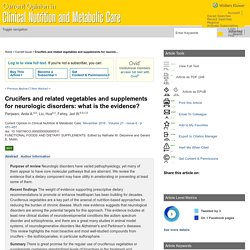
We review the evidence that a dietary component may have utility in ameliorating or preventing at least some of them. The weight of evidence supporting prescriptive dietary recommendations to promote or enhance healthspan has been building for decades. Cruciferous vegetables are a key part of the arsenal of nutrition-based approaches for reducing the burden of chronic disease. Much new evidence suggests that neurological disorders are among the potential targets for this approach. This evidence includes at least nine clinical studies of neurodevelopmental conditions like autism spectrum disorder and schizophrenia, and there are a great many studies in animal model systems, of neurodegenerative disorders like Alzheimer's and Parkinson's diseases.
aCullman Chemoprotection Center bDepartment of International Health, Center for Human Nutrition Correspondence to Jed W. Caloric Requirements of Patients With Brain Impairment and Cerebral Palsy Who Are Dependent on Chronic VentilationJournal of Parenteral and Enteral Nutrition - Rena Gale, Julia Namestnic, Pierre Singer, Ilya Kagan, 2017. ESPEN guideline clinical nutrition in neurology Inc ALS Stroke. Perspective: Neuroregenerative Nutrition. + Author Affiliations Address correspondence to DAS (e-mail: dennis.steindler@tufts.edu).
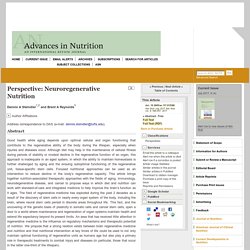
Abstract Good health while aging depends upon optimal cellular and organ functioning that contribute to the regenerative ability of the body during the lifespan, especially when injuries and diseases occur. Although diet may help in the maintenance of cellular fitness during periods of stability or modest decline in the regenerative function of an organ, this approach is inadequate in an aged system, in which the ability to maintain homeostasis is further challenged by aging and the ensuing suboptimal functioning of the regenerative unit, tissue-specific stem cells.
Focused nutritional approaches can be used as an intervention to reduce decline in the body’s regenerative capacity. Keywords: Footnotes Perspective articles allow authors to take a position on a topic of current major importance or controversy in the field of nutrition. . © 2017 American Society for Nutrition. Nutritional Challenges in Duchenne Muscular Dystrophy. 1.
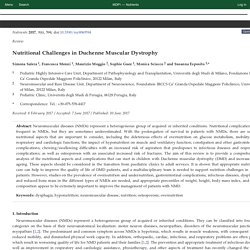
Introduction Neuromuscular diseases (NMDs) represent a heterogeneous group of acquired or inherited conditions. They can be classified into four major categories on the basis of their neuroanatomical localization: motor neuron diseases, neuropathies, disorders of the neuromuscular junction, and myopathies [1,2]. The predominant and common symptom across NMDs is hypotonia, which results in muscle weakness, with consequent fatigue, reduced mobility, and diminished physical work capacity.
In addition, orthopaedic, cardiac, infectious, and respiratory problems are often present, which result in worsening quality of life for NMD patients and their families [1,2]. Nutritional complications are often present in NMDs and worsen with age. 2. Among NMDs, DMD is the only disease for which specific growth charts are available. Regarding height, several studies have demonstrated that children with DMD are shorter, on average, than the typical male child, regardless of steroid therapy [8,10]. 3.
Motor neurone disease: assessment and management. This guideline covers assessing and managing motor neurone disease (MND).
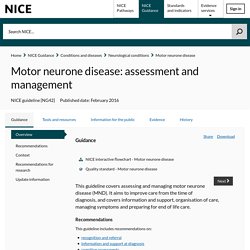
It aims to improve care from the time of diagnosis, and covers information and support, organisation of care, managing symptoms and preparing for end of life care. This guideline replaces NICE guideline CG105 (July 2010) and includes new recommendations on assessing and managing MND. Your responsibility The recommendations in this guideline represent the view of NICE, arrived at after careful consideration of the evidence available. When exercising their judgement, professionals are expected to take this guideline fully into account, alongside the individual needs, preferences and values of their patients or service users. Local commissioners and/or providers have a responsibility to enable the guideline to be applied when individual health professionals and their patients or service users wish to use it. Congenital muscular dystrophy: Evidence-based guideline summary: Evaluation, diagnosis, and management. Special Article Report of the Guideline Development Subcommittee of the American Academy of Neurology and the Practice Issues Review Panel of the American Association of Neuromuscular & Electrodiagnostic Medicine Peter B.
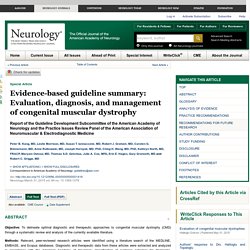
Dietary interventions for chronic fatigue syndrome/myalgic encephalomyelitis: a systematic review. Abstract Background Chronic fatigue syndrome/myalgic encephalomyelitis (CFS/ME) is characterised by unexplained fatigue for at least 6 months accompanied by a diverse but consistent set of symptoms.
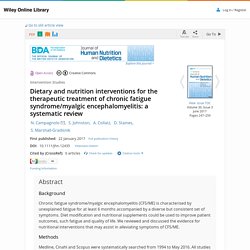
Diet modification and nutritional supplements could be used to improve patient outcomes, such fatigue and quality of life. We reviewed and discussed the evidence for nutritional interventions that may assist in alleviating symptoms of CFS/ME. Methods Medline, Cinahl and Scopus were systematically searched from 1994 to May 2016. Results Seventeen studies were included that meet the inclusion criteria. Conclusions This review identified insufficient evidence for the use of nutritional supplements and elimination or modified diets to relieve CFS/ME symptoms.
Introduction The current worldwide prevalence of CFS/ME is estimated to be between 0.8% and 3.3% [4]. Materials and methods Literature search Three databases were utilised: Medline (EBSCOhost), Cinahl (EBSCO) and Scopus. Nutrition in Neurologic Disorders - Springer.